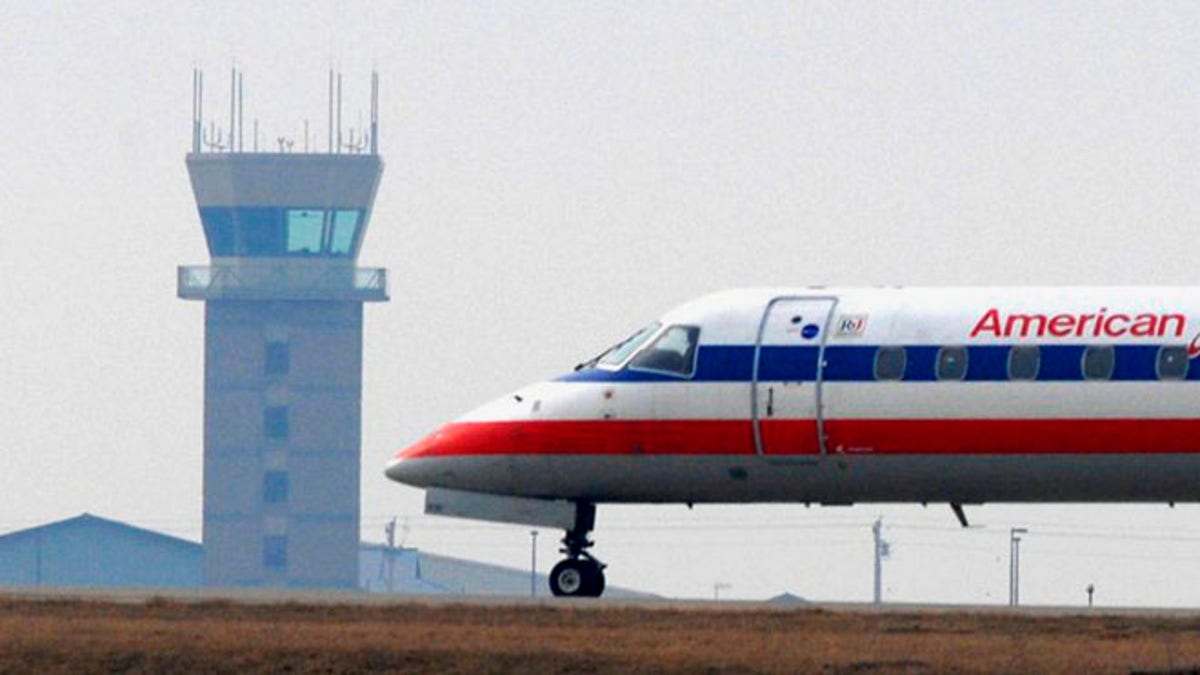
March 9, 2010: In this photo, an American Eagle flight waits for release from the air traffic control tower at Central Illinois Regional Airport in Bloomington, Ill. (AP/The Pantagraph)
The Federal Aviation Administration announced Friday that it will close 149 air traffic control towers, in a move one lawmaker said was akin to "removing stop lights and stop signs from our roads."
That lawmaker, Republican Kansas Sen. Jerry Moran, also claims the FAA could save the towers by tapping into millions of dollars in unspent FAA research money.
Yet the FAA moved forward Friday with plans to shut down the air traffic control facilities, describing them as a necessary cutback due to the sequester.
"These were very tough decisions," Transportation Secretary Ray LaHood said in a written statement.
The cuts will affect small airports starting April 7. The closures will not force the shutdown of any of those airports, but pilots will be left to coordinate takeoffs and landings among themselves over a shared radio frequency with no help from ground controllers under procedures that all pilots are trained to carry out. The FAA decided to keep open 24 towers that were on the original list of possible closures.
"We will work with the airports and the operators to ensure the procedures are in place to maintain the high level of non-towered airports," FAA Administrator Michael Huerta said in a statement.
But the plan has raised concerns about the impact on safety and the potential financial effect on communities that rely on airports as key economic engines for attracting businesses and tourists.
"The administration's decision to shutter these air traffic control towers is short-sighted and dangerous," Moran said in a statement "Closing control towers is equivalent to removing stop lights and stop signs from our roads. It is clear that this administration is putting its top-line message, that spending cannot be cut without severe consequences, before the safety and well-being of Americans."
Moran is pushing an amendment to take $50 million from "unobligated FAA research and capital funds" from past spending bills and use that to save the air traffic control towers. The amendment did not receive a vote when proposed as part of the recently passed 2013 stopgap spending bill -- it's unclear whether it could get a vote Friday as an amendment to the 2014 budget resolution. However, any amendment to the 2014 budget package would have no effect this year, and the senator is considering introducing the proposal as a stand-alone bill.
The National Air Traffic Controllers Association also blasted the decision announced Friday, while spreading the blame between Congress and the administration.
"The closure of these air traffic control towers will reduce the overall margin of safety of our entire aviation system," association president President Paul Rinaldi said. "Ultimately, the partisan posturing in Washington that led to sequestration is the reason for today's decision and its destructive effects on aviation. The FAA made a bad situation worse by not utilizing a well-thought-out process for evaluating the value of air traffic control towers before ordering their closure."
Rep. Jim Sensenbrenner, R-Wis., also voiced concern that "75 percent of the towers the Obama administration is closing are located in Republican congressional districts."
Under the sequester, the FAA has to trim $637 million for the rest of the fiscal year that ends Sept. 30. The agency said it had no choice but to subject most of its 47,000 employees, including tower controllers, to periodic furloughs and to close air traffic facilities at small airports with lighter traffic. The changes are part of the across-the-board spending cuts known as sequestration, which went into effect March 1.
All of the airports targeted for tower shutdowns have fewer than 150,000 total flight operations per year. Of those, fewer than 10,000 are commercial flights by passenger airlines.
Airport directors, pilots and others in the aviation sector have argued that stripping away an extra layer of safety during the most critical stages of flight will elevate risks and at the very least slow years of progress in making the U.S. aviation network the safest in the world.
Airlines have yet to say whether they will continue offering service to airports that lose tower staff. Any scaling back of passenger service could have major economic impact for communities.
The Associated Press contributed to this report.




